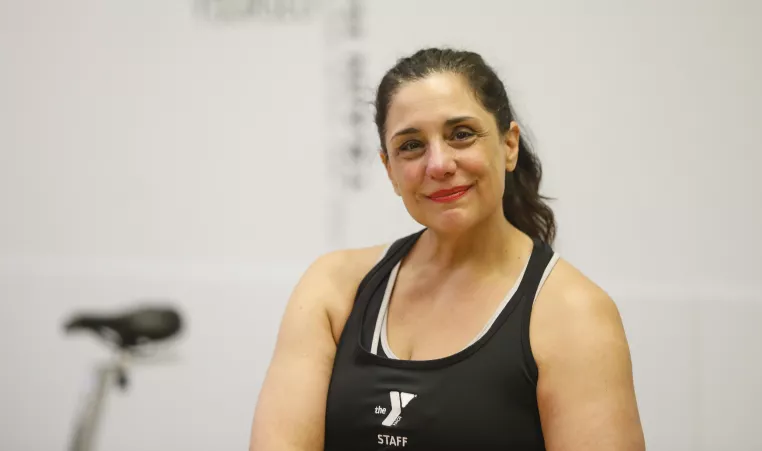
FIVE DAILY MEDITATION TIPS
GETTING STARTED MEDITATING
Blog content from Andrea Antonetty, Group Exercise Instructor
It’s easy for us to get caught up in the day-to-day business of life. That’s why it’s important to take a moment for yourself. Andrea, one of our talented group exercise instructors who has a passion for mindfulness, has put together five tips to get you started – one day at at time.
DAY ONE
Why is Meditation a Superpower? What are your superpowers? We all have superpowers. Do not be shy, dig deep and discover what your superpowers are and how they make you unique. I believe that mindfulness is a superpower and it is something that can be easy to achieve if you practice mindfulness based meditation every single day. What you practice grows stronger, so keep practicing mindfulness based meditation.
Neuroscientists have studied mindfulness and discovered that meditation actually changes the physical structure of the brain. According to Greater Good Magazine, long-term, consistent meditation can make you more resilient because it reduces the inflammatory response when exposed to stressors.
Mindfulness based meditation can help reduce stress, control anxiety, promote emotional health, enhance self-awareness, lengthen attention span, may reduce age-related memory loss, generate kindness and may help fight addictions.
This video will explain why meditation is a super power and ask yourself if you want to achieve this superpower.
DAY TWO
It is important to remember that we can consciously choose to find calm in any moment with our attitude. Stress is a reality of life and life is going to happen. The small choices we make day to day and moment to moment can determine the quality of the life that we want to lead.
Mindfulness is the mind/body connection of life, being conscious of our thoughts, feelings and actions, to help us focus on being in the present. So, why do we need mindfulness in our lives? More and more we are seeing the impact of toxic stress in our relationships, work and in our community. Healthy stress is a natural part of life and necessary to push us to grow and develop. But toxic stress impairs attention, emotional regulation, sleep, learning and life. Over the long term, it can lead to serious mental and physical health issues. For many people, prolonged exposure to toxic stress leads to decreased productivity and creativity as well as increased frustration, anxiety and burnout.
Meditation is a scientifically proven exercise for your brain.
Here are the steps to get started:
- Find a comfortable and quiet place to sit with your eyes closed or eye gaze lowered.
- Notice your breath going in and out.
- If your mind wanders, just bring it back to the breath.
Yes, it can be that simple.
Watch this video that is meant to be a beginner’s guide to help you get started with meditation and mindfulness.
DAY 3
Do you have a friend, family member or co-worker that is a good listener? How does it make you feel to be around that person?
Mindful listening is a way of listening without judgment, criticism or interruption, while being aware of internal thoughts and reactions that may get in the way of people communicating with you effectively.
Mindful listening can help you improve your relationships by removing roadblocks on that two-way street. When you listen mindfully to your partner, friend, family member or colleague, it can improve your understanding and compassion, and reduce frustration.
One of my favorite ways to practice mindful listening is something called a bell activity. Check out this video for adults and this video for children to learn more about mindful listening.
Remember, what you practice grows stronger so keep practicing.
DAY 4
The body scan is one of the most effective ways to begin a mindfulness meditation practice. The purpose is to tune in to your body—to reconnect to your physical self—and notice any sensations you’re feeling without judgment. While many people find the body scan relaxing, relaxation is not the primary goal.
Body scan meditation is a practice that involves mindfully scanning your body as you pay attention to sensations. Benefits can include:
– Improved awareness
– Reduced stress
– Better sleep
– Help coping with pain
– Improved focus
– Increased self-compassion and gratitude
I personally enjoy practicing a body scan because it relaxes me and helps me forget about the chronic pain that I suffer from in my body.
If you want to practice a body scan, please listen to this video for adults and this video for children.
DAY 5
Loving Kindness Meditation is a popular self-care technique that is used to reduce stress while boosting well-being. Those who regularly practice loving kindness meditation are able to increase capacity to forgive, connect to others and have greater self-acceptance.
Here is how to practice the Loving Kindness Meditation:
- Carve out some quiet time for yourself (even a few minutes will work) and sit comfortably. Close your eyes, relax your muscles, and take a few deep breaths.
- Imagine yourself experiencing complete physical and emotional wellness and inner peace. Imagine feeling perfect love for yourself, thanking yourself for all that you are, knowing that you are just right—just as you are. Focus on this feeling of inner peace, and imagine that you are breathing out tension and breathing in feelings of love.
- Repeat three or four positive, reassuring phrases to yourself. These messages are examples, but you can also create your own:
– May I be happy
– May I be safe
– May I be healthy, peaceful, and strong
– May I give and receive appreciation today